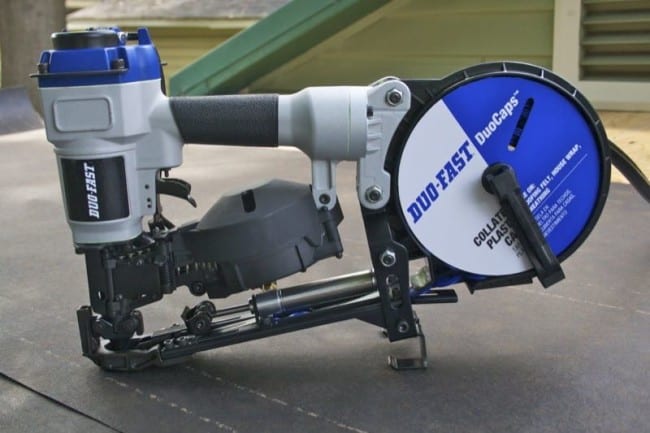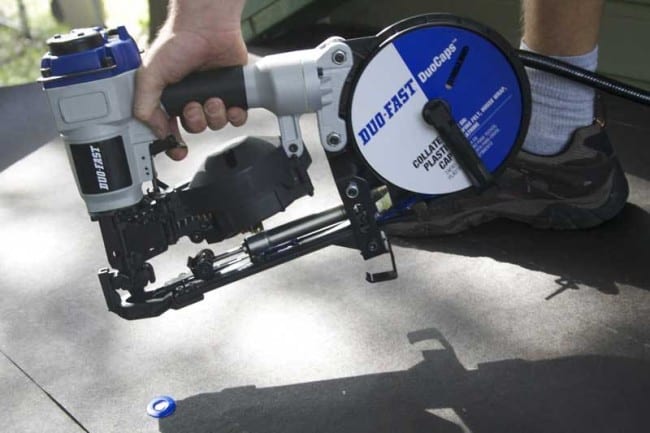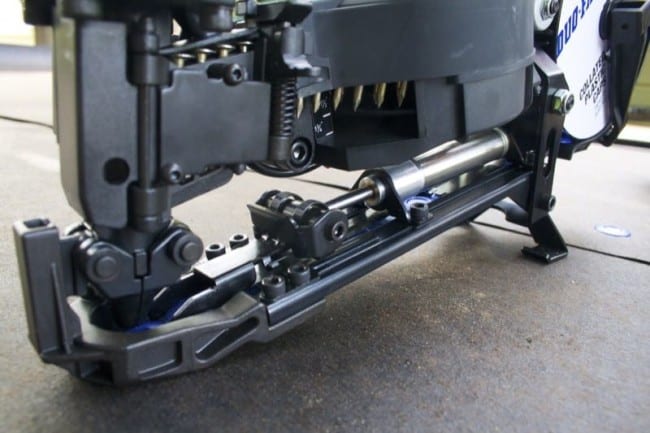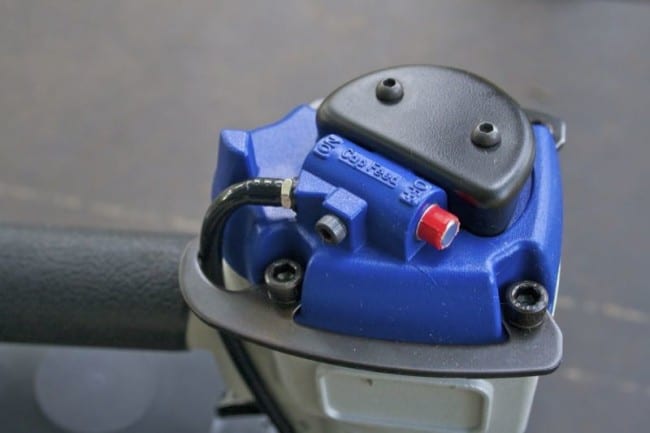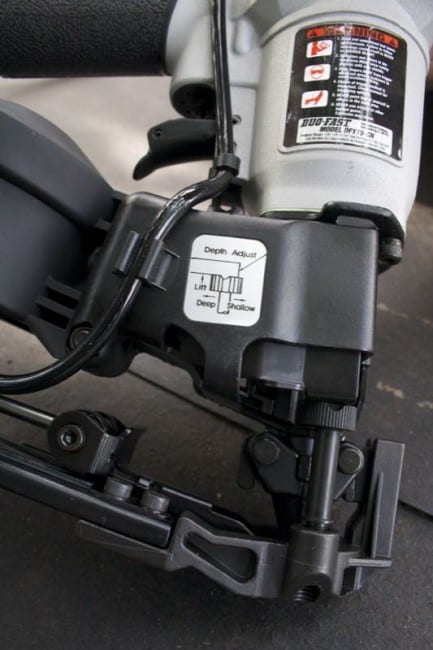We typically avoid roofing whenever we can. There, we said it. It’s a grueling job that, in Florida, takes everything out of you. Of course, in the home renovation world, the more we “avoid” it, the more we end up doing it anyway. Roofing in the South is a job best left to those who don’t mind charging a fair wage to live and work out under the hot sun, bent over a black felt-papered roof driving thousands of nails until you feel as if there’s no conceivable way that much water could have possibly poured out of your body without rendering you into a living, breathing piece of beef jerky. Yes, that last sentence was long – just like every roofing job we’ve ever done. If I want to take every opportunity to shorten the time up on a roof, then certainly the guys who only do roofing could use a tool like the Duo-Fast DF175-CN cap nailer. Why? Because, like all great tools (great, not good) it saves you time and energy. If you can shave an hour or more off that hot roofing job, in Florida, in June, you’re going to want to do that. You’re REALLY going to want to do that.
Build Quality and Features
With the DF175-CN Cap Nailer the first thing we noticed was that it uses standard 120-count roofing coil nails (from 7/8″ to 1-3/4″). This is a welcome feature in a market where many companies force you to use their proprietary fasteners. It’s also fast. Really fast. In fact, there’s a lot to like about the Duo-Fast DF175-CN cap nailer. For one, it’s an in-line system, meaning it’s better at getting into tighter spaces since the cap system is tucked onto the back of the tool, rather than the front or off to the side. The weight which, at just over 9 pounds when loaded, is ample. But it’s also evenly distributed along the length of the tool and it doesn’t tip forward or back when you hold it by the handle with your thumb off the tool and your fingers relaxed. The trigger was easy to pull and we could use the tool with gloves on or off – without it making much of a difference. There is a rubberized grip along the handle, but it isn’t inset into the tool handle at all, so there’s a good chance it will tear up or come loose over time.
The Duo-Fast DF175-CN Cap Nailer (also marketed as the DCR175-CN or part #511300) comes with a Milton 727 type air coupler for standard 3/8″ I.D. hose. This is nice since most pneumatic tools make you buy a coupler on your own before you can use it. We’ve opened up countless tools over the years only to realize we needed another part to make them work (you think we’d learn our lesson by now). The tool needs around 80 PSI to function properly, so you get a lot of work in between cycles, even with a smaller compressor. We used a Bosch CET4-20W 4 Gallon 2 HP Air Compressor and with the tank charged up to 120 PSI, we got a lot of nails driven in before the compressor kicked on. The tool comes configured in bump fire mode, and steel protective bars flank the tool, so you can set it down on rough shingles without messing up the body of tool.
Using the Duo-Fast DF175-CN Cap Nailer in the Field
Using the tool consists of loading it up and going to town. Loading the coil nails was very straightforward, and anyone who’s done any amount of roofing will immediately gravitate to the easy and familiar loading mechanism. The coil magazine has a floating platform that is height-adjustable to properly feed the nails into the firing chamber without jamming. It has the expected three settings and it only takes a single spring-loaded twist to maneuver the base into its proper height.
The DuoCaps come in cardboard-flanged spools (240 caps per spool, 2400 per carton, 7200 per master carton) and load easily into the back of the tool. A plastic locking lever extends outward to allow you to slide the spool on. It then folds over and locks securely to the plastic housing to keep the collated plastic caps in place and allow them to spin-feed as they are advanced by the pneumatic mechanism.
Now, the one feature that we didn’t think we’d use much, but which kept coming in handy, was the cap-feed defeat switch. On the top of the tool there is a silver sliding button. This button instantly disables the air flow to the cap feed system, turning the tool into a straight (albeit heavy) roofing nailer. While you’d never want to use the Duo-Fast DF175-CN cap nailer as a dedicated roofing nailer to do a large roof, it was nice to be able to switch back and forth when we ran into something that needed to be quickly fastened down. The cap feed button even has a red sticker on the one side to let you know that cap feeding has been stopped. We don’t think the sticker will hold up well, but the switch is clearly labeled so this shouldn’t be an issue, even in the long-run.
The Duo-Fast DF175-CN cap nailer comes with a tool-less adjustable depth of drive and a quick-clear nose, so you can perfectly set the tool to work with your compressor. This is important in the event that you are up on a roof and your compressor is still set to feed your framing nailer. Rather than crack all your DuoCaps, you can simply back off on the depth and keep right on working. We were able to set the firing depth quickly and easily.
 When it came time to really cranking on our roofing job, we found that the Duo-Fast DF175-CN cap nailer could go as fast, or faster, than we could. It made the work of nailing down 30# felt underlayment a breeze and each DuoCap was seated securely and perfectly each time. Consistency was almost perfect with this tool. The spooling mechanism never once jammed on us, only initially giving us trouble until we figured out how to properly feed in the first DuoCap to get it started (user error). After that, we were off and running at a pace that would be unmatched by even the most aggressive and accomplished tradesman who tried to do the job with cap nails and a hammer. And what’s really nice is that the system uses standard roofing nails, so you don’t have to worry about either staple systems that aren’t yet approved for all local building codes or buying proprietary nails that drive up the price of the job and lower profits. The DuoCaps are proprietary for this tool, but they are extremely affordable compared to some other systems we’ve seen and used. We also like that they are sold in lots of 7200, so you can match your quantities to that of a standard case of roofing coil nails.
When it came time to really cranking on our roofing job, we found that the Duo-Fast DF175-CN cap nailer could go as fast, or faster, than we could. It made the work of nailing down 30# felt underlayment a breeze and each DuoCap was seated securely and perfectly each time. Consistency was almost perfect with this tool. The spooling mechanism never once jammed on us, only initially giving us trouble until we figured out how to properly feed in the first DuoCap to get it started (user error). After that, we were off and running at a pace that would be unmatched by even the most aggressive and accomplished tradesman who tried to do the job with cap nails and a hammer. And what’s really nice is that the system uses standard roofing nails, so you don’t have to worry about either staple systems that aren’t yet approved for all local building codes or buying proprietary nails that drive up the price of the job and lower profits. The DuoCaps are proprietary for this tool, but they are extremely affordable compared to some other systems we’ve seen and used. We also like that they are sold in lots of 7200, so you can match your quantities to that of a standard case of roofing coil nails.
Conclusion
After using the Duo-Fast DF175-CN cap nailer for a considerable amount of time, it’s our new go-to tool for laying down felt on roofs. For the siding contractor, this nailer would be a great choice for installing vapor barrier to the sides of a building as well. If you’re worried about staying power, you can opt for ring shank coil nails, though we think straight roofing nails worked just fine. The Duo-Fast Cap Nailer System (DF175-CN) has a suggested retail price of $449 and comes with a one year warranty. This is a tool that should get a lot of use out of professionals. It’s not a paradigm shift by any means – just a better way to secure felt, housewrap, and just about any other synthetic underlayment materials. If you do this for a living and you’re still doing it by hand, you’re going to want to look at this tool and try it out for yourself.


